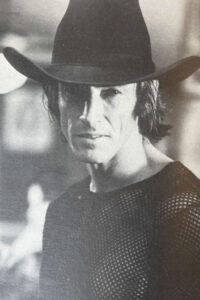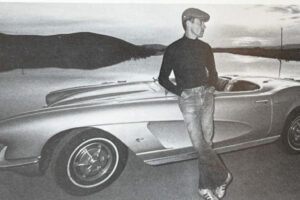This summer [Editor’s Note: originally published July 1982] the country is being treated to one of the best movies ever made about women. It’s a thrilling, sensual piece of celluloid called Personal Best. The pivotal performance in this movie about women is played by a man: Scott Glenn. He plays Mariel Hemingway’s coach, Terry Tingloff, a role he plays masterfully with tension, power and affection.
Scott Glenn and his family are four-year Ketchum locals. Last week, while home on hiatus from playing Alan Shepard, the astronaut in a new film called The Right Stuff, he consented to be interviewed by his hometown magazine. Scott arrived for the interview looking as though he had just stepped from the pages of an early ’60s LIFE magazine. He was driving a 1962 silver Corvette convertible and was sporting a brown leather aviator jacket and a regular Air Force haricut.
Scott Glenn sends the cliché of “dumb actor” packing.
SUN VALLEY MAGAZINE:
With Hollywood being the center of the movie industry, how can you live in Ketchum?
SCOTT:
About 4½ years ago, my wife, Carol, who is a clay artist, got accepted to the Sun Valley Center for the Arts and Humanities at the time that Jim Romberg was running the ceramics department. It was one of the best in the country. She was coming up here for the summer program and she was bringing our kids, Dakota and Rio. At the time we were living in Topanga Canyon and it looked like I was going to be doing this movie called Altered States. Initially, it was Arthur Penn, Paddy Chayevsky and me. During the readings to work on the script Penn and Chayevsky were having fairly heated arguments about how the film should proceed. Penn was fired and eventually someone else did the film. Anyway, Carol said, “Hey, babe, why do you always have to have the excuse of a job to kick you in the ass to go anywhere in your life?”
During this period, I had been rock climbing fairly extensively in Southern California. I wasn’t a hot climber, I just loved to do it. I’m a great coolie so if someone wanted to do some hot vibe leads, they could call me up and I’d follow along behind and clean up the pitches and drag all of the stuff up. Carol told me about this guy, Eric Ryback, who was doing an Outward Bound sort of trip. So I decided to go on a shakedown with him into the Bighorn Crags for 11 or 12 days. At the end of the 12 days, Carol picked me up in Challis. I remember how weird it felt to be in an internal combustion machine after being in a place like that. And Ketchum looked like fuckin’ New York to me. I thought to myself, “Holy shit! Look at all of those people!” When I got back to Ketchum, what I noticed was that my oldest daughter no longer had a bronchial cough that she had had for several months in Los Angeles. And she already had two friends. My youngest daughter was running around going crazy. She’s very physical and she had found a zillions ways to get off. Carol and I were real solidly in love and it was real good and hot. Everything in the family was just great. I got a phone call from Fred Roos, a producer for Fancis Coppola, and he asked me if I wanted to do a movie that George Lucas was producing called More American Graffiti. So the whole family went back to L.A. and I went to San Francisco and did the movie. Then I went back to L.A. The whole family got the blues again. We were bitching at each other and Dakota had started coughing again. I hadn’t been working in L.A. for almost three years, not anything worthwhile, anyway. So I thought, “Fuck it, man, let’s go back to Ketchum and just live there.”
I asked Carol what she thought and she loved the idea. My life in Hollywood is extremely competitive. The pressures are tremendous. What I really needed, and didn’t consciously know it at the time, was a place where I could come to neutral. Here, nobody cares that I’m an actor and I can come to neutral (snaps fingers) just like that.
SUN VALLEY MAGAZINE:
How did the move affect your career?
SCOTT:
When I left Los Angeles, I was with a big agency, ICM, and when I told them I was going to live in Idaho, they said, “Who do you think you are, ROBERT REDFORD?!! You can’t do that, you’ll never work!” and I said, “WHAT’S NEW??!!”
One of the things that happened, strange, is that I got back to my old dreams of acting I had when I was in New York. In L.A., I’d start telling myself that I still care about acting, I still care about my dreams. But the truth of the matter is I was really worried about what I was up for, what my billing was going to be and how much money I was going to make. All of that crap. It’s been magic since I moved here.

SUN VALLEY MAGAZINE:
Your role as the wicked Wes Hightower in Urban Cowboy was extremely powerful and convincing. How did you prepare for that role?
SCOTT:
I guess somewhere inside of me that character lives. Inside everyone is Albert Schweitzer. Inside everyone is Adolf Hitler. We’re all human beings. So what you do is find the parts of your personality where that character lives.
In acting, as in any art, you have to learn how to find places in your personality that are latent, find out where the dials are and turn up the volume for a period of time. For months, they become dominant, not latent, and they control your whole animus. They literally do. So I worked it that way to get ready for Wes Hightower. When I got to Houston to do Urban Cowboy, I ran into some old acquaintances of mine that I met through Freddy Fender who make their living illegally and violently. Mexican guys. I hung out with them and some rodeo cowboys for about three weeks. I also stopped at Huntsville Prison for 3-4 days and slept outside the prison in a sleeping bag, in different places where I thought you might be able to get over the wall. I wanted to know about the little things that no one would ever see in the movie that would key me off.
What was most interesting about these kinds of characters is that they’re not only magnetic and interesting, but if you spend time around them, they’re horrible, scary, uncomfortable and abusive.
SUN VALLEY MAGAZINE:
So when your whole animus is busy being Wes Hightower, what happens to your real life?
SCOTT:
After a month of doing the part, my life starts to imitate my art. It starts to happen to me a lot. It was very tough for Carol. She brought the kids down and they were going to stay for two months and within five days they were on their way back up here. She and I have been together for about 15 years and she totally knows about me. She said, “Look, I really love you; I’ll be waiting for you in Idaho. I can’t stand this Wes Hightower, so you just let me know when he’s dead.” You know, when she first arrived and walked over to kiss me, I almost threw her across the room. I was really horrible.
At one point the bathroom on the honeywagon on the set didn’t work. I asked the assistant director if he’d get it fixed. He said, “Oh Scott, you don’t have to worry about that, that’s no concern of yours.” He said it in front of all the extras in Gilley’s. They were real Gilley’s people, they were not from the Screen Actors Guild. I knew that they had to believe that I was that awful character when I walked in because acting had nothing to do with them or their lives. So when the AD said that was none of my business, I went out to the police car, got out a shotgun and walked into the honeywagon and took out the whole place. Toilet, ceiling and everything.
SUN VALLEY MAGAZINE:
How did the director feel about that?
SCOTT:
He loved it. He knew what he was getting into when he hired me and he certainly knew what I was doing.
SUN VALLEY MAGAZINE:
So, bottom line is that you basically turned into Wes Hightower.
SCOTT:
Yeah, pretty much. But I left Wes Hightower somewhere in Wyoming on the drive up from Houston. Kicked him out the door and told him that I never wanted to see him again.
SUN VALLEY MAGAZINE:
Was it your idea to eat the worm?
SCOTT:
Yeah, it was never supposed to be in the movie. It was the end of the night and we’d been drinking mezcal. I said to Jim that I can get the worm out of the bottle, why don’t we put it in the film so that we can laugh about it in dailies. He said, “Great!” So I just did it. It’s no big deal.
SUN VALLEY MAGAZINE:
So you’ve eaten worms before?
SCOTT:
Thousands of them. I spent some time in southern Texas with Freddy Fender and some guys that he knows. One of the games they play with the gringos is everyone sits around a table and everyone puts a $100 bill in the middle of the table. They pass the mezcal bottle around and the first one who gets the worm out wins all of the money. What gringoes invariably try to do is to get the worm and they pass out. The only possible way to do it is to stick your tongue in the neck of the bottle, wait for the worm to float down and suck in the biggest gulp that you can and you’ve got it. Jim, the director, ended up puttig it in the movie and it turned out to be something that everyone remembers.
SUN VALLEY MAGAZINE:
About Personal Best … How did two people from Ketchum end up in the same movie?
SCOTT:
Blind luck. We didn’t know each other before. I had no idea who Mariel Hemingway was. The first time that I ever met her, I was in the Coffee Grinder [Editor’s Note: current site of Ginger Sweet juice bar, Ketchum] and she came in with Willie McCarty, who has since become a really good friend of mine. The two of them came in. I said “Mariel!” and she yelled, “Scott!” We just couldn’t believe it. Warner Brothers freaked out because two of the leads in their movie were from a town of 2,500 people in Idaho. It just happened that way, that’s all.
SUN VALLEY MAGAZINE:
In Personal Best, who is your character Terry Tingloff, and what was his history prior to being a women’s coach?
SCOTT:
He was an athlete himself: a college gymnast, a college fencer, and he coached both football and gymnastics for men. He could have gone on to do that, but decided not to because of women’s athletics. Terry was an explorer and women’s athletics is an incredible frontier right now. I had a note to myself that the essence of the character of Terry Tingloff is that he’s a closet lesbian. Literally, he’s someone who so identifies with women, loves them, and cares for them, that you could really call him that. There’s a section of my own personality that has a much easier time dealing with women than with men. My manager is a woman, I’ve got two daughters, and the people who have helped me in the business have all been women. So I just put all of that together in this character. And doing Personal Best with those women was the best experience that I’ve ever had.
SUN VALLEY MAGAZINE:
It’s amazing what you’ve gotten to learn in your life as a result of your craft. It’s almost as though your craft is a vehicle to get your body all of these wild places so that you can learn to do everything that you’ve always dreamed of being able to do.
SCOTT:
You’ve found me out!! It’s a magic carpet and a total unwillingness to live just one life this time through.
SUN VALLEY MAGAZINE:
Your newest film, The Right Stuff, has certainly brought you to the forefront as a successful actor. Now that you’ve “arrived,” do people ever ask you about acting as a career?
SCOTT:
When I was in Eugene, a lot of kids, particularly young girls, would come up and ask me about acting. I said to them, “Do it because you love to do it; don’t do it because of what you think is at the end of the line or it will break your heart. Always do it out of a sense of appetite for the thing itself … If it makes you drool, if it gets your feet tapping, then do it and stay with it.”


